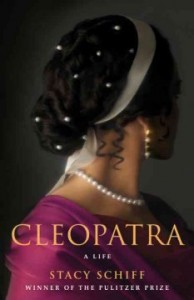Cleopatra: A Life
March 6, 2013Women’s history, rivals, the spirit of competition – why not one of the most famous women in history and a great competitor? That would be Cleopatra VII, Queen of Egypt….
 Women’s history, rivals, the spirit of competition – why not one of the most famous women in history and a great competitor? That would be Cleopatra VII, Queen of Egypt.
Women’s history, rivals, the spirit of competition – why not one of the most famous women in history and a great competitor? That would be Cleopatra VII, Queen of Egypt.
The idea for this blog came from one of our Novel Conversations book group leaders, Lynell Wolff, Reference & Homebound Librarian at the Harris Branch of the Mishawaka-Penn-Harris Public Library. Lynell wrote: “I think rivalry was huge back in the time of Cleopatra. Have you read Cleopatra: a Life by Stacy Schiff? Even within families it was not uncommon to eliminate a sibling if you believed he or she might try to take control.”
When Cleopatra’s father died, she inherited the throne at the age of 18, but she was supposed to share it with her brother (and husband) Ptolemy XIII. Thirteen must have been an unlucky number because in the midst of a civil war between the two siblings, Cleopatra charmed her way into Julius Caesar’s favor and thus gained the upper hand. Ptolemy did not survive, nor did his brother and successor as Cleopatra’s co-ruler, Ptolemy XIV.
Schiff says: “Succession became a perennial crisis for the Ptolemies, who exacerbated the matter with poisons and daggers. Intermarriage consolidated wealth and power but lent a new meaning to sibling rivalry . . . .”
If Cleopatra’s legendary beauty was merely a legend, Schiff does not doubt her charm, her wealth, her gift for intrigue and her remarkable education in Greek letters and culture. The result is a rich portrait of a queen and the world she ruled, in which she had no rival.
In February and March, Indiana Humanities is exploring the topic of “rivalry,” as part of its Spirit of Competition theme. This post was written by Nancy Conner, director of grants and coordinator of Novel Conversations.


